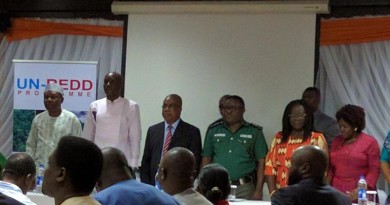Climate activists call out TotalEnergies for planned investment in EACOP project
As TotalEnergies announced over $16 billion in profits on Thursday, the highest of any company in France’s history, climate activists and community members called out the oil giant for putting profits over people, due to its involvement in the East African Crude Oil Pipeline (EACOP) project.
EACOP has faced continued opposition from communities and climate activists, citing threats to the environment and livelihoods of communities in the area. TotalEnergies and its partners recently announced that they had reached a Final Investment Decision on EACOP, indicating willingness to go ahead with the project, but climate activists are optimistic that it will not secure funding to see the project through. This scenario is seemingly more likely, as 4 more banks pulled out of the EACOP this week, bringing to 15, the number of banks that have distanced themselves from the project. Activists and affected communities are piling pressure on financial institutions that are yet to take a clear stand on EACOP, to stop the flow of funding into the project that has already displaced thousands.
Landry Ninteretse, 350Africa.org Regional Director, said, “TotalEnergies has been associated with opaque contracts, lack of accountability and violation of basic rights of grassroots communities across Africa and beyond. Total continues to invest heavily and almost exclusively in oil and gas across the world, causing unbearable suffering and injustices to communities living near operation sites in Uganda, Tanzania, Mozambique, Nigeria, etc, making efforts to limit global warming to 1.5 degrees almost impossible. TotalEnergies should immediately halt any new oil and gas projects, starting with EACOP, a project that not only poses a threat to sensitive ecosystems in East Africa, but has also resulted in widespread displacement, loss of livelihoods and human rights violations.”
Omar Elmawi, #StopEACOP coordinator said, “TotalEnergies is putting profits over people and it shows. Communities in Uganda and Tanzania have been fighting tirelessly against the planned EACOP pipeline and the trail of destruction it is already leaving in its wake. At a time when scientists call for the phasing out of fossil fuel projects, to avoid the worst impacts of climate change, it is ill-advised and irresponsible to go ahead with this project, while ignoring the cries of those most affected.”
Diana Nabiruma of the Africa Institute for Energy Governance said, “When criticized over the EACOP project, Total says that the EACOP and its upstream Tilenga oil project in Uganda are low-cost and low-carbon. These assurances do not cut it. Everyone knows that cheap things are expensive in the long run. Operational costs are cut at the expense of environmental conservation and protection of communities’ livelihoods. Total should put people over profits and invest in clean energy instead.”
Samuel Okulony, Environment Governance Institute Uganda said, “In 1908, Sir Winston Churchill described Uganda as the pearl of Africa and this was because of its beautiful scenery, an abundance of natural resources, and biodiversity. With this beauty, Uganda can generate its sustainable income to support its economy. But today TotalEnergies is coming to destroy the country’s natural heritage and increase carbon into the atmosphere by wanting to exploit for oil in the Lake Albert basin. Every right-thinking citizen has to resist these atrocities on Ugandans. The banks and investors must listen to the cries of an old woman who cannot take her children to school, the young girl who got pregnant because of an uncertain future, the man who cannot feed his family because his land was forcefully acquired without adequate compensation, the fishing communities who can no longer get food for their household. That is why we say stop EACOP, stop oil activities in Uganda.”
Juliette Renaud, Senior campaigner at Friends of the Earth France, said, “Total’s record profits come from its unscrupulous activities around the world, year after year they continue violating human rights of affected communities, destroying unique biodiversity hotspots and fueling the climate crisis with giant oil and gas projects in Uganda, Mozambique and the Arctic. Even in France, they put profits before people, and use a greenwashing plan to put hundreds of direct and indirect jobs at their Grandpuits refinery at risk ”.


